|
Versión en español
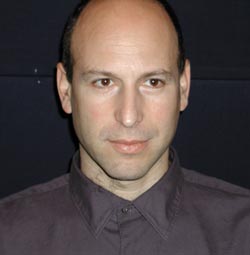 About Inon Zur About Inon Zur
Inon Zur was born in Israel but currently lives and works in Los Angeles. He's an internationally acclaimed composer for film, television and video game soundtracks, field where he's one of the A-list composers. In 2004, Zur shaped history by conducting and recording his dramatic orchestral score for Men Of Valor. He has composed music for other high-profile titles such as Starcraft: Ghost, SOCOM II: U.S. Navy SEALS, Baldurís Gate II: Throne Of Bhaal, Icewind Dale II, Shadow Ops: Red Mercury, Champions Of Norrath: Realms Of EverQuest and the cinematics for Prince Of Persia 2: Warrior Within. His powerful orchestral scores are featured in promotional trailers for Hollywood movies such as Kingdom Of Heaven, The Pacifier, Fantastic Four and The New World. Zur's music can also be heard in the hit television series Into the West.
BSOSpirit (BS): How did you become interested in musical art?
Inon
Zur (IZ): Music was always with me since a very young age. As far back
as I can remember I was always very tuned to all kinds of music, singing
all the time and coming up with melodies and harmonies. My parents supported
my enthusiasm for music and enrolled me for piano and composition classes
when I was 8 years old. My connection to music has continued to grow throughout
the years, and I continue to learn about music today.
BS: Let us review your career as a composer:
In 1994 you worked on a score for Valley of the Dolls,
a television series. Was it your true start? How did you manage in those
days?
IZ: This show was my first experience of working in Hollywood, but
before that I used to compose student films and had attended many film
festivals, meeting young directors and trying to get composition work.
Of course, every beginning is hard, especially for me, a young man who
emigrated from Israel and didnít have any connections in the entertainment
world.
BS: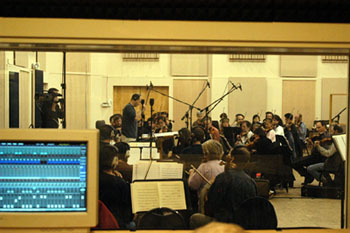 1997 marked your involvement in The Powers Rangers, scoring the film Turbo: A Power Rangers Movie. How did you come to work for this project? 1997 marked your involvement in The Powers Rangers, scoring the film Turbo: A Power Rangers Movie. How did you come to work for this project?
IZ: In those days I was working as a staff composer at the Fox Family Channel, and this movie was produced there. Another composer was hired to do the film, but because of some problems he had to have immediate help, so I was brought in and contributed about 30 minutes of music to this movie. This was my first feature film, and I remember it as a very special experience.
BS: Did you follow anything about the
previous work scored by Graeme Revell for the superhero
saga, or did you merge with something different?
IZ: I was going my own
way on this film, but I used some of the previous themes that were composed
for the TV series. At that time I was composing music for the TV series,
and in fact, I made a lot of changes to the overall style of this show.
Traditionally it was always rock oriented, but when I came on board
I encouraged the orchestral style, and sure enough, the producers really
liked that direction. Since then all these shows turned from rock/pop
style to orchestral music.
BS: From all your work on the Power Rangers saga, what part you value the most? What particular theme or composition would you like to keep for the record?
IZ: I remember for some of the scenes when the Power Rangers are getting prepared with their new gear and tools I composed music in a John Williams-esque style. Also in some of the battle scenes I created some unusual combinations of tribal percussions and orchestral elements, and that came out pretty well.
BS: You have also worked for some
East Asian productions. Does it make any difference to work for Eastern
movie-makers?
IZ: Absolutely! The whole idea of combining music with
picture is so different than in the Western world. I learned a lot from
these experiences because they gave me a different prospective in scoring
for films.
BS: Star Trek: 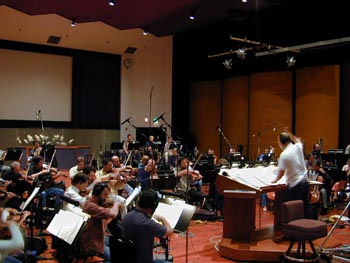 New Worlds was your first score written for a video-game. New Worlds was your first score written for a video-game.
IZ: Actually, Star Trek: Klingon Academy came first, and then New World. It was very exciting to work on such a different media than TV and movies, and I felt I was entering a whole new world of opportunity and artistic understanding.
BS: Do you need to change composing schemes when working for created images, instead of real ones?
IZ: I treat any visual medium, animated or live action, in the same way. We want to compose music that will help to convey a part of reality, usually the emotional impact, so it doesnít matter at all if itís Ďrealí or computer generated. The story is the most crucial point when you come to compose, as it is through the story that you find the way to convey the emotions.
BS: Your involvement in Star Trek has brought, if I am not wrong, two more tittles up to date, Star Trek: Klingon Academy and Star Trek: Starfleet Command. Did you use any common theme, any identifying track, common to the three parts?
IZ: Not really. Each title has its own realm and I composed totally different themes for each one of them. The musical style was close, but also different enough to maintain its own originality. For example, in Klingon Academy I used the operatic choir to bring out the gothic and dark mood, and in Starfleet Command I brought loud brass to enhance the military style, and some tribal instruments to describe several races in the game.
BS: A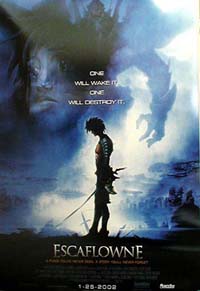 n
important achievement in your career has been, without doubt, the score
written for Escaflowne. How did you come to take part
in this project?
IZ: Escaflowne n
important achievement in your career has been, without doubt, the score
written for Escaflowne. How did you come to take part
in this project?
IZ: Escaflowne was brought to me for
composing during my time as a staff composer in the Fox Family
Channel. I was really impressed by the quality of the story
and the animation, and my music was inspired by all of that. The mood
of this show is really dark and mystical, so I was using lots of choir
vocals along with the orchestral sounds.
BS: You also created a musical atmosphere for Forgotten Realms, with some scores. How did you plan your work for this video-game?
IZ: I based my music more on the atmosphere of the games and the emotions I wanted to evoke, rather then on the specific actions. The locations were also a major part of my inspiration, as well as the engaging storyline.
Certain characters and their behaviour also drove my writing. I was always enchanted by these role playing worlds, and I really loved working on those games.
BS: Prince of Persia 2: Warrior Within is an amazing video-game. How did you come to work for this particular project?
IZ: I have a good relationship with the music people at Ubisoft, so when it came to hiring a composer to score the cinematics, they just called me up. The in-game music was more rock oriented, and they wanted something more orchestral for their cinematic movies, which is what Iím best known for. I recorded with the Hollywood Studio Orchestra at Warner Bros. Studios in Burbank for that project, and it was a great experience.
BS: How do you balance creative and industrial requirements when working for a soundtrack in general?
IZ: This is always a good question, when it comes to artistic decision. I need to find a balance between what I really like to write and what I think the audience will appreciate, and often I need to make choices and concessions. The priority however is that the developer/producer will feel that the music serves his or her game in the best way, and Iím always well aware of that. This is my main guideline when I need to make artistic choices.
BS: Allow me to stress that Prince of Persia 2: Warrior Within is a real masterpiece. But, why isnít there a recorded edition of that soundtrack?
IZ: This happened because of technical issues, specifically the contract with the musicians union (AFM). For the next game we are going to change the contract, so you can expect a soundtrack release for Prince of Persia 3: Kindred Blades.
BS: Most of your works have only been edited in a promotional format, except for St. Patrick: The Irish Legend which has been officially edited for the record. Whatís wrong with editing more CDs with your music projects?
IZ: Putting out a soundtrack is not always a priority for the publisher, and as much as I want to publish everything Iím working on I know that this is also a matter of profit and necessity. Some music, as good as it is, was originally written to serve a specific project and that is it. Nevertheless, sometime in the near future Iím intending to release a selection of my music under my name, and I hope to realize my dream soon.
BS: I think St. P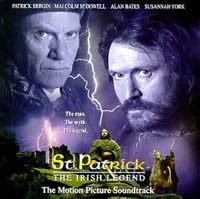 atrick is one of your best scores until now. What would you underline now about this work? atrick is one of your best scores until now. What would you underline now about this work?
IZ: St. Patrick was a great opportunity for me to dive into the Irish, Celtic and Christian worlds, and the music style for this film was something I had wanted to do for a long time. It was also a worldwide production for me, since I recorded the music for this movie in Ireland, Israel and Los Angeles. The experience was really special.
BS: Men of Valor is another score of yours to be recommended... Where did you take your inspiration of? Was it all just about the video-game?
IZ: I am from a war torn country, Israel, so I think I brought to the table my own perspective about this chaotic experience. Obviously, I used some Asian influences for the Vietnam War setting, but the heart of the music was represented through my own personal experience, rather than trying to capture a war that I have no connection to or experience of.
BS: 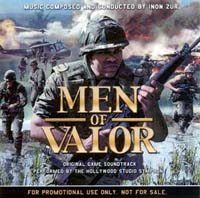 Will it ever be any official CD edition of Men of Valor? Will it ever be any official CD edition of Men of Valor?
IZ: I hope so. However, as far as I know there are currently no plans of this sort, but perhaps in the future. In the meantime you can download some of the tracks via the official website:
Men of Valor
(direct download:
here).
BS: Your latest works have been devoted to the video-game industry. Doy you find comfortable in this area? Will you score again for the movies or the television?
IZ: I love to score for picture, in any media. I have found videogames to be a very satisfying experience, but still plan to score more films. There are many differences between the two media, and I enjoy them both.
BS: Just to finish, could you comment on any future projects?
IZ: Currently Iím working on Prince of Persia 3: Kindred Blades, which should be released later this year. Unfortunately Iím not permitted to talk about other future projects, but these will be revealed later on my website
www.inonzur.com.
Interview by DDBSpawn (David Doncel Barthe)
|





